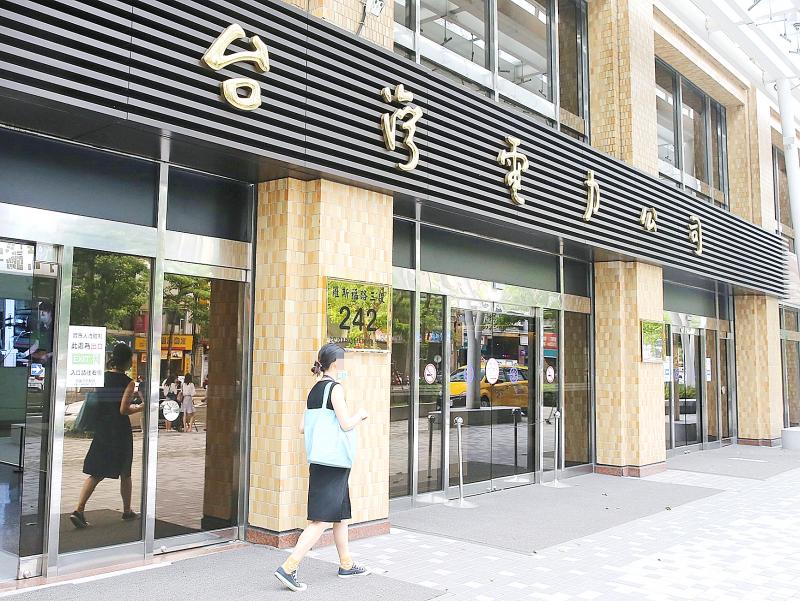From Wednesday next week, owners of electric vehicles would be charged NT$262.50 per month for household electricity use in addition to varying electricity surcharges, state-run Taiwan Power Co (Taipower, 台電) said on Sunday.
Taipower said the new rates aim to encourage vehicle charging during off-peak hours.
They would apply to the nation’s about 10,000 electric vehicle owners at their registered residence, as well as public charging stations, the utility said.

Photo: CNA
In addition to the monthly fee, electric vehicle owners would be charged a surcharge of NT$34.6 per kilowatt-hour (KWh) from October to May and NT$47.2 per KWh from June to September.
Taipower said it would also impose variable demand surcharges on electric-vehicle owners to ease the strain on the nation’s power grid.
From October to May, electric-vehicle owners would be charged an extra NT$8.13 per KWh between 3pm and 9pm, with the surcharge falling to NT$1.95 per KWh outside of those hours.
During the high energy consumption period from June to September, the surcharges would increase to NT$8.35 per KWh between 4pm and 10pm, and NT$2.05 per KWh outside of those hours, Taipower said.
The company said it hopes the new rates would encourage electric-vehicle owners to charge their vehicles outside of peak hours.
The new rates, which have been approved by the Ministry of Economic Affairs, would be officially announced tomorrow and take effect on Wednesday next week, the company added.
The company said it introduced the new rates in light of a considerable increase in sales of electric vehicles in Taiwan and a subsequent increase in demand for electricity.

MORE VISITORS: The Tourism Administration said that it is seeing positive prospects in its efforts to expand the tourism market in North America and Europe Taiwan has been ranked as the cheapest place in the world to travel to this year, based on a list recommended by NerdWallet. The San Francisco-based personal finance company said that Taiwan topped the list of 16 nations it chose for budget travelers because US tourists do not need visas and travelers can easily have a good meal for less than US$10. A bus ride in Taipei costs just under US$0.50, while subway rides start at US$0.60, the firm said, adding that public transportation in Taiwan is easy to navigate. The firm also called Taiwan a “food lover’s paradise,” citing inexpensive breakfast stalls

TRADE: A mandatory declaration of origin for manufactured goods bound for the US is to take effect on May 7 to block China from exploiting Taiwan’s trade channels All products manufactured in Taiwan and exported to the US must include a signed declaration of origin starting on May 7, the Bureau of Foreign Trade announced yesterday. US President Donald Trump on April 2 imposed a 32 percent tariff on imports from Taiwan, but one week later announced a 90-day pause on its implementation. However, a universal 10 percent tariff was immediately applied to most imports from around the world. On April 12, the Trump administration further exempted computers, smartphones and semiconductors from the new tariffs. In response, President William Lai’s (賴清德) administration has introduced a series of countermeasures to support affected

CROSS-STRAIT: The vast majority of Taiwanese support maintaining the ‘status quo,’ while concern is rising about Beijing’s influence operations More than eight out of 10 Taiwanese reject Beijing’s “one country, two systems” framework for cross-strait relations, according to a survey released by the Mainland Affairs Council (MAC) on Thursday. The MAC’s latest quarterly survey found that 84.4 percent of respondents opposed Beijing’s “one country, two systems” formula for handling cross-strait relations — a figure consistent with past polling. Over the past three years, opposition to the framework has remained high, ranging from a low of 83.6 percent in April 2023 to a peak of 89.6 percent in April last year. In the most recent poll, 82.5 percent also rejected China’s

PLUGGING HOLES: The amendments would bring the legislation in line with systems found in other countries such as Japan and the US, Legislator Chen Kuan-ting said Democratic Progressive Party (DPP) Legislator Chen Kuan-ting (陳冠廷) has proposed amending national security legislation amid a spate of espionage cases. Potential gaps in security vetting procedures for personnel with access to sensitive information prompted him to propose the amendments, which would introduce changes to Article 14 of the Classified National Security Information Protection Act (國家機密保護法), Chen said yesterday. The proposal, which aims to enhance interagency vetting procedures and reduce the risk of classified information leaks, would establish a comprehensive security clearance system in Taiwan, he said. The amendment would require character and loyalty checks for civil servants and intelligence personnel prior to